How you can use chores to develop skills your toddler needs.
How’s your pile of laundry, Mama? Or should I rather not ask!?
It might be time to outsource that task, and a bunch of other chores, to a certain little person in your home.
And here’s the best part! You can use chores to develop skills your toddler needs to lay a foundation for so many other skills they will develop as they learn and grow! You’ll be surprised at how many of these tasks they’re ACTUALLY capable of doing!

Toddlers love chores!
I don’t know about yours, but my kiddies LOVE to help with chores around the house! What seems like a complete drag and burden sometimes for me, is the most exciting adventure for them. Whether it’s feeding our dogs or helping mommy put clothes into the washing machine, taking dishes out of the dishwasher or sweeping up a mess (which ends up being a bigger mess actually!) – it’s just so much fun!
I know letting them help can mean that the task takes so much longer. Maybe the mess ends up even more spread out and messy. And the folded clothes, well, they’re probably going to need to be ironed again!
But letting your toddler help with chores is crucial to developing so many skills that you really don’t want to miss out on the opportunity!
10 quick tips for doing chores to develop skills in your toddler.
Here are 10 quick tips to make this easier for you. And you won’t have to compromise on the opportunity to use chores to develop skills your toddler needs.
- Choose chores or parts of chores you know they can do – age and stage appropriate. You know your child best!
- Let them help with one thing while you’re doing something else.
- Don’t enlist their help when you’re in a rush and are likely to snap if they get it wrong or make a bigger mess.
- Show them how to do the task – model it for them. And then as they get more adept at the task they can do it more on their own.
- When they don’t do it properly, don’t immediately correct them or re-do it! You’ll crush their self-esteem. Commend them on what a good job they did. Then you can decide if you NEED to show them the correct way or if you can leave it until next time.
- Stay positive about chores – if you show them you hate chores, they’ll grow up hating them too. And unfortunately, chores are just part of life. And never use chores as a punishment – you’ll never have your child on your side with this!
- Be super patient and gracious. Some of these tasks will be a real challenge for them – they’re really just trying their best!
- Make it fun! Kids are more likely to do anything if it’s fun!
- Check your timing for asking your child to help with chores. Right after they wake up, before bed-time, when they’re hungry or tired, when they want to do something else – these are NOT good times to ask for help!
- Be generous with praise! Build their confidence and self-esteem by telling them what a great job they’re doing! This free Chores Reward Chart will help you encourage your child and build their self-esteem.
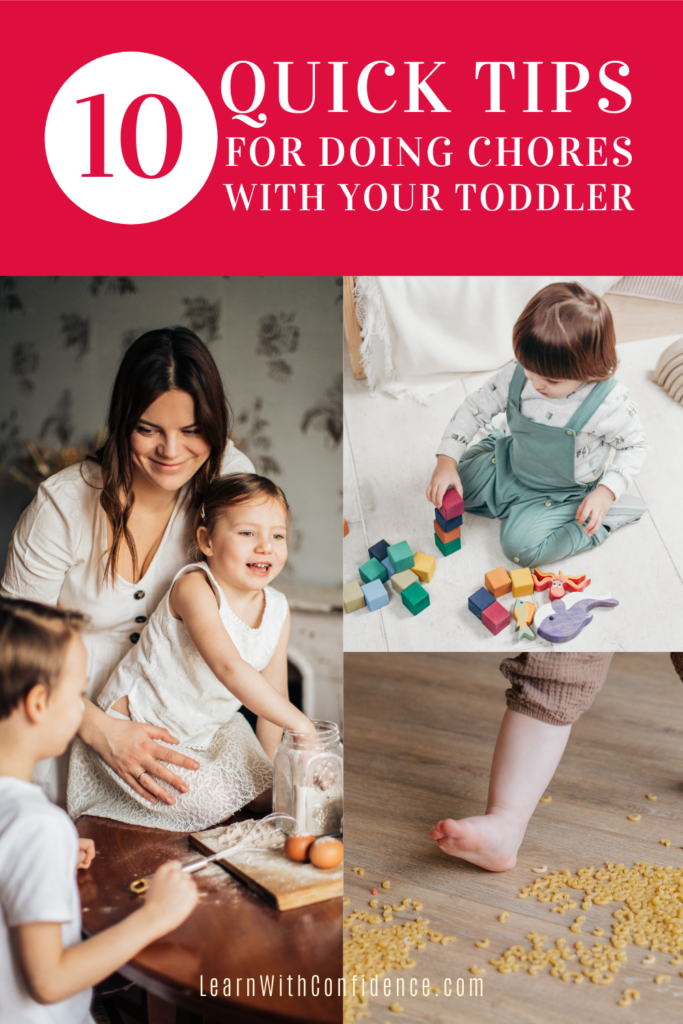
What skills does my toddler need to develop?
We know there are a host of developmental and life skills that toddlers need to develop through those early years. That can seem quite daunting!
The good news is that, in everyday life, they are learning and practicing those skills more than you’re sometimes even aware of! Whew! What a relief!
So, what are some of the skills toddlers need to develop?
Gross motor skills
These are skills that use the “big” muscles of the body. Activities that require “big” movements or the whole body are going to develop these skills.
Some examples are running, jumping, throwing a ball, catching a ball, climbing up and down things, crawling under an obstacle, pushing or pulling an object.
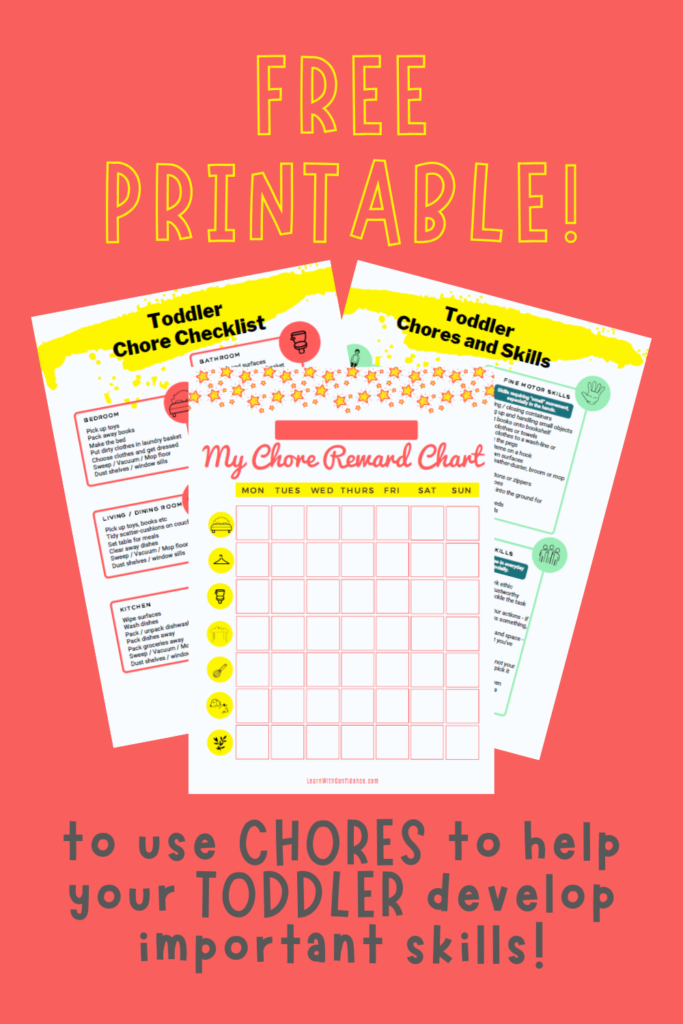
Fine motor skills
Fine motor skills use the “small” muscles, particularly in the hands. But they are also influenced by the child’s posture, core muscle tone, and shoulder stability.
These are the muscles your child will develop and use to write and color in, pick up small objects with their thumb and forefinger, cut with scissors, trace lines or follow patterns.
Perceptual skills
Perceptual skills cover a variety of areas in the child body and brain. These are all about how we “perceive” things and process that information.
They include the following:
- visual processing (seeing) ,
- auditory processing (hearing),
- sensory integration (especially involving touch),
- proprioceptive skills (perceiving your body in space),
- visual-spatial skills (perceiving objects in relation to other objects),
- And a host of cognitive skills such as memory, attention, organizational skills, recognition of patterns, colors and shapes and language development.
How can I use chores to develop skills my toddler needs?
This is a list of chores your toddler is likely capable of doing – depending on their age and development. I’ve paired them up with some of the skills they can develop through doing these chores. Here’s a FREE Chore Checklist you can keep handy to give you some ideas about chores your toddler can help with.
Picking up their toys
Whether they’re strewn across the bedroom or spread throughout the house, tidying up their own toys – their property – is important. This might include: big toys like a doll pram or truck, books, smaller toys, and very small items like crayons or little bits of paper.
- Gross motor – picking up, pushing onto a shelf, crawling under the bed to find toys, closing a drawer or cupboard
- Fine motor – opening and closing containers, hand-eye coordination, picking up and handling small toys, crayons, etc.
- Perceptual – Sorting and categorizing, visual-spatial perception, following instructions, practicing their prepositions (on top, behind, next to), concept of size, shape or color and organizing items accordingly.
Laundry
Tasks include: putting dirty clothes in the basket, sorting it into piles according to color or type of item, putting clothes into and taking them out of the machine, hanging up washing and taking it off the line, folding it, packing it away into the cupboards or drawers.
- Gross motor – picking up clothes, pushing them into the machine, pulling them out of the machine, pulling them off the washing line, packing clothes onto shelves / in drawers
- Fine motor – folding clothes, pegging clothes to a washing line, taking pegs off
- Perceptual – sorting, color concept, sensory integration in feeling different fabrics, following instructions, visual-spatial perception when packing clothes into drawers or cupboards.
Bath-time chores
These might include: Putting dirty clothes in the laundry basket, packing away bath toys, wiping down the bath, taking their towel back to the bathroom / hanging it up and hanging the bath mat over the bath to dry.
- Gross motor – Picking up clothes, wiping down the bath, hanging up a bath towel or bath mat, walking while carrying the bath towel back to the bathroom, balance while changing / dressing.
- Fine motor – Hanging cloths or a loofa on a hook on the wall, picking up bath toys and placing them in a basket.
- Perceptual – Following instructions, sensory integration – being in the water while doing these tasks, sorting or organization when packing toys away.
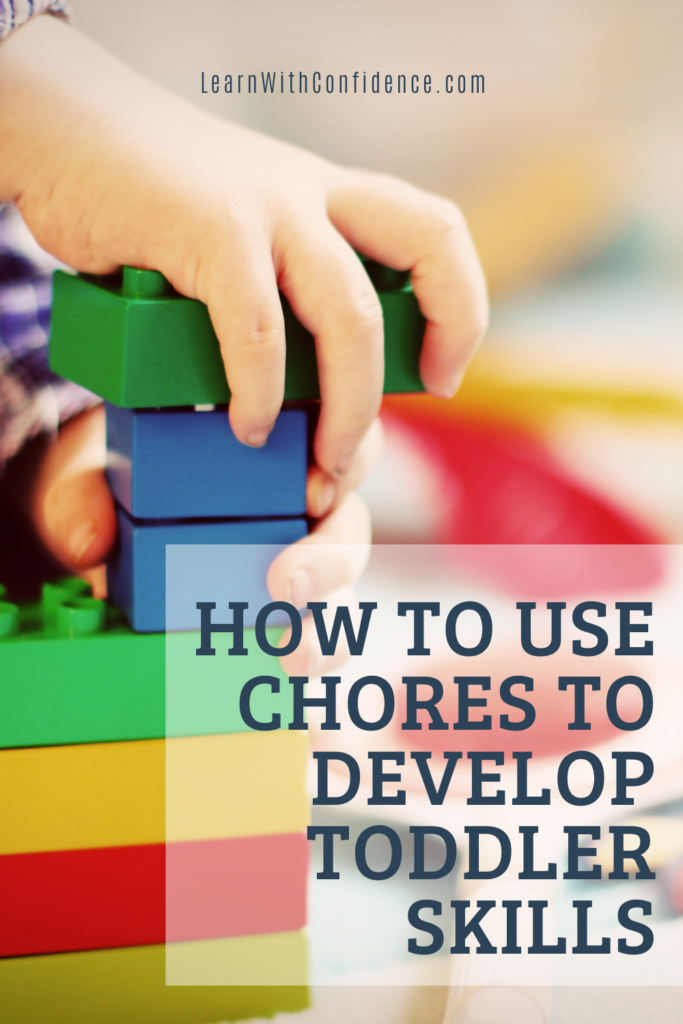
Cleaning up spills and messes
Ah toddler-life, with all of the thrills and spills! Your child can help with wiping up spills and messes, sweeping, mopping or even vacuuming the floors, dusting surfaces (watch out for your breakables!)
- Gross motor – wiping the counters or floor with a paper towel or cloth, sweeping, mopping and vacuuming use gross motor skills.
- Fine motor – fine motor movement of wiping, holding a feather-duster in hand, holding and using a broom or mop.
- Perceptual – Planning, visual-spatial perception of seeing where the mess is and having to sweep or mop it up,
Chores around morning routines
What routine do you have each morning when your toddler wakes up? These are a few chores they can assist with: making their bed, choosing their clothes and shoes, getting dressed, taking any cups or bottles through to the kitchen.
- Gross motor – pulling the bed covers straight, placing the pillow in the correct place, balance while dressing
- Fine motor – doing up buttons, zippers or velcro, putting on shoes, picking up and carrying cups or bottles
- Perceptual – decision-making, planning, proprioception while dressing, putting the correct shoe on the correct foot.
Meal-time chores
Meal-times are an important family bonding opportunity in many cultures. So teaching your child how to take care of the necessary chores is important. These might be: Setting the table, clearing away the dishes, helping with packing or unpacking the dishwasher, washing dishes by hand, wiping down surfaces.
- Gross motor – Carrying dishes from one place to another, wiping down surfaces.
- Fine motor – holding the forks or knives or spoons when placing them on the table, using a sponge to wash the dishes by hand,
- Perceptual – following instructions, planning and order (eg. how many plates or serviettes are needed, packing the dishwasher), sensory integration while having hands in the water while washing dishes, visual-spatial perception – packing the dishwasher, setting the places at the table.
Gardening chores
Whether you have a giant garden or a tiny one, or just a few pot plants on a window sill, getting your kiddos to help with gardening chores is a great way for them to practice taking care of nature. They can help with raking up leaves, pulling weeds, planting seeds and watering plants.
- Gross motor – using the rake, holding the hose-pipe or watering-can while watering the garden,
- Fine motor – pushing little holes into the ground, picking up the little seeds and placing them in the holes, pulling out weeds,
- Perceptual – sensory integration while handling the soil, decision making – deciding which plants are weeds and which aren’t, planning (with help) which seeds must be planted where in terms of the sun and shade.
Some other chores
And here are a few miscellaneous chores your toddler can help you with: Feeding pets, taking in bags and shoes from car after school, packing school bags in the evenings, emptying small bins or waste-paper baskets, helping to take groceries in from the car.
- Gross motor – walking while holding the dogs bowl, carrying various items from the car to the house
- Fine motor – pouring the dog food into the bowl from a measuring cup, holding the dogs bowl while walking, using zippers on school bags, packing items in school bags, eg, books or clothing, handling the small rubbish bin – pouring trash out into a bigger bin, using hand strength to help carry grocery items into the house from the car
- Perceptual – planning (with help) how much food the dog needs to get, planning what items should be packed in school bags, proprioception, visual-spatial perception – packing items into bags
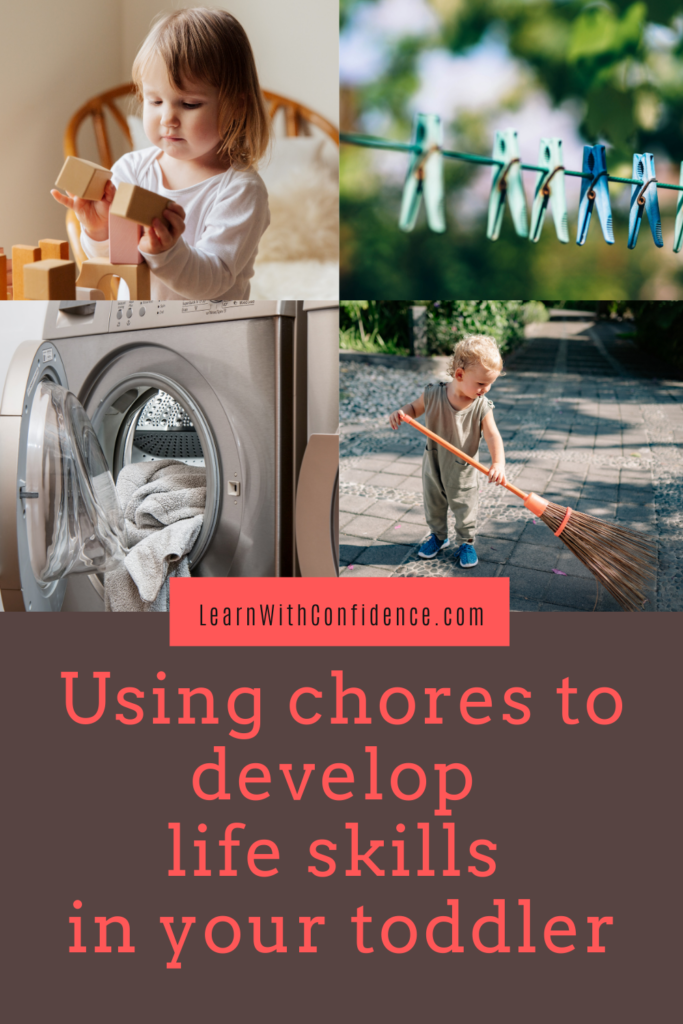
Using chores to develop life skills.
All of the above chores develop various life skills that your child will use in everyday life, now and forever!
Let’s just consider a few:
- Developing a strong work ethic.
- Being responsible and trustworthy.
- Team work – when you tackle the task as siblings or as a family.
- Taking responsibility for your actions – if you drop something or mess something, you clean it up.
- Taking care of your property and space – being a good steward of what you’ve been given.
- Sharing
- Helping others – sometimes it’s not your toy, but you can help your sister pick it up!
- Building a strong self-esteem – when they feel proud for accomplishing a task.
- Expressing yourself.
Plus, they’re going to need to know how to do laundry or sweep the floor or wash dishes if they’re going to survive when they move out of your home! They might as well start learning now!
Keeping it real.
There’s so much in everyday life that can give our kiddos the opportunity to learn and grow!
They don’t have to have the latest toys and gadgets and devices. We can even use something as mundane as chores to develop skills and prepare them for life!
Because that’s the ultimate goal, right!? To prepare our little humans to be and become more independent, responsible, caring, wonderful people.
Don’t forget to download my FREE Toddler Chore Kit which has a checklist of all the chores and skills mentioned in this post PLUS a bonus Chore Rewards Chart to encourage your child!
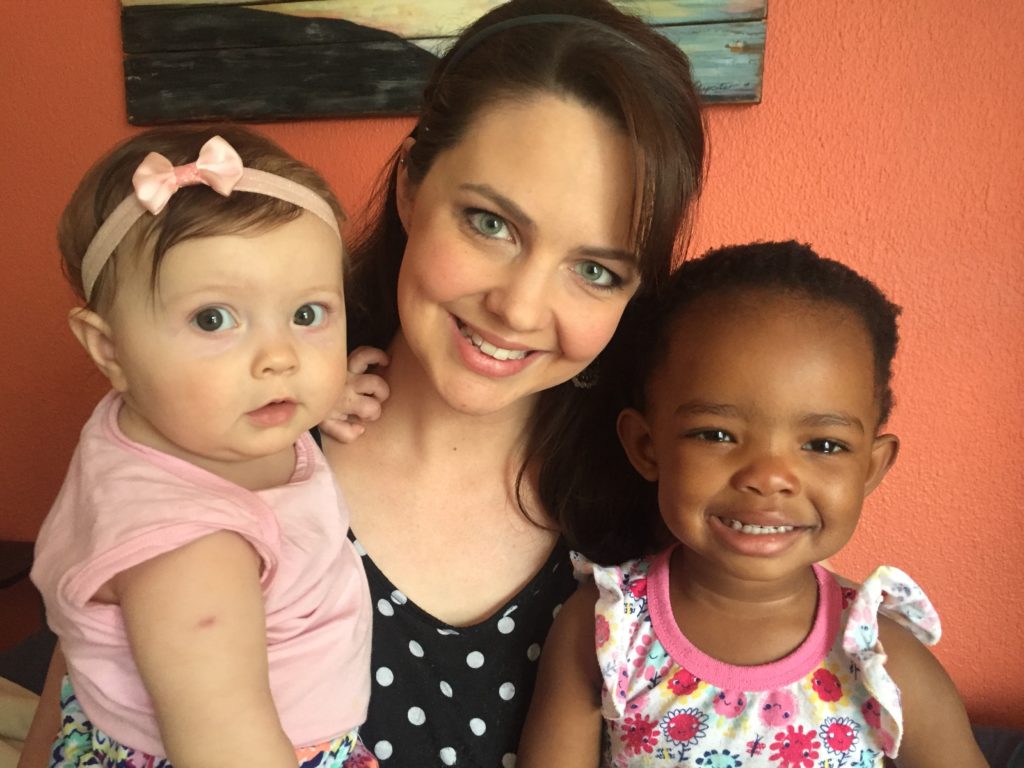
I would love to connect with you and hear all about your life! And I’d love to include you in this community of Mommies as we support each other and grow together to become the best moms we can be!
Please subscribe to my emailing list here and I’ll make sure I keep you in the loop on all the latest blog posts, freebies and resources!
You may also enjoy these articles!

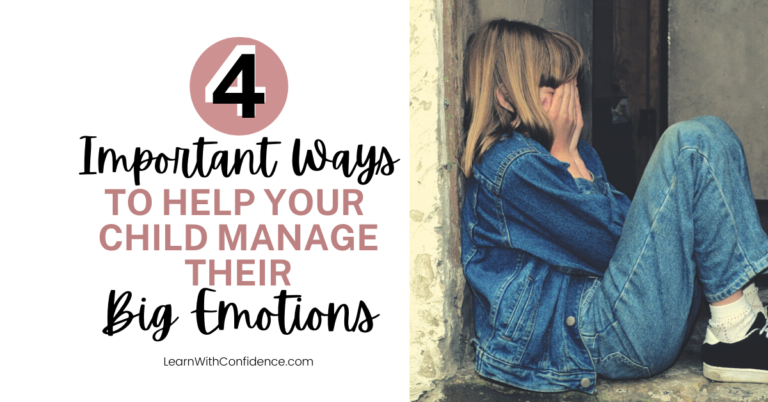


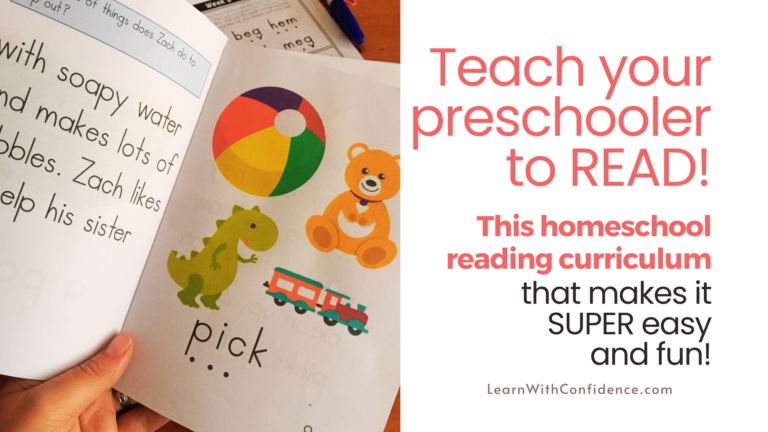
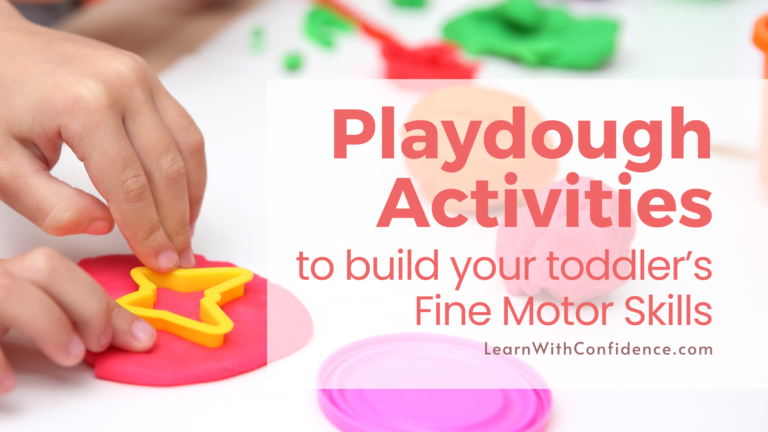
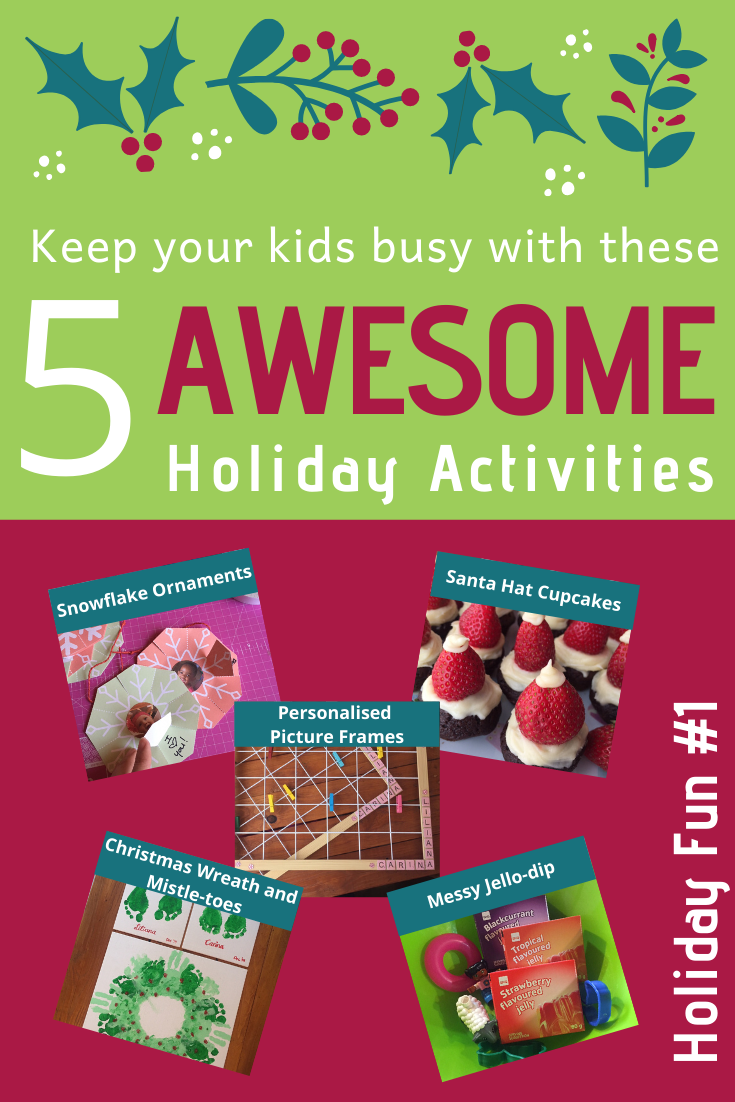
Great tips! I especially like not enlisting their help when you’re rushed. My aunt always joked “I would have been done sooner, but I had help”- it for sure takes longer when they’re learning, but hopefully pays off as they get older!
Thanks Anne! I totally feel your aunt’s comment though! 😅